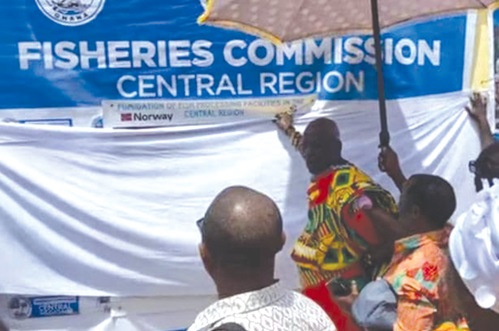The Ministry of Fisheries and Aquaculture Development has announced that the new Fisheries and Aquaculture Bill, 2025, awaiting presidential assent, will expand the area in which small-scale fishers can operate.
This is in response to persistent intrusion by industrial trawlers encroaching into this zone by six nautical miles.
Speaking at the opening of the Central Regional Fish Fair in Cape Coast, the Deputy Executive Director at the Fisheries Commission, Dr Eric Cobbinah, said the country’s inshore exclusion zone, or IEZ, will now extend 12 nautical miles (22 kilometres) from shore, up from the current six nautical miles (11 km) when the bill is assented into law.
The Central Region Fish Fair was instituted as an annual programme by the Central and Western Fishmonger Improvement Association (CEWEFIA), the Environmental Justice Foundation (EJF) and Hen Mpoano, with funding from the government of Norway under the Sustainable Oceans Project.
The fair aims to expose fishers to markets and sustainable fishing practices and also serves as a platform to educate fishery stakeholders on quality and safe fish handling.
The occasion this year was also used to launch an exercise to fumigate 85 fish processing facilities that have been certified to ensure the production of safe and quality fish.
The fumigation exercise would be undertaken by Agromonti Company Limited, with support from the Fisheries Commission for fishmongers free of charge.
Severe punishment
Mr Cobbinah said the new fisheries and aquaculture bill would ensure severe punishment for all illegal, unregulated and unreported fishing activities that continue to negatively impact the fishery stocks.
He said the Fisheries Commission would not deal leniently with offenders.
"The oceans are not merely vast bodies of water; they are life-support systems.
They provide food, livelihoods, climate regulation and cultural heritage for millions of our people.
Yet, our oceans are under serious threat.
Overfishing, illegal fishing practices, pollution and climate change are depleting fish stocks and damaging marine ecosystems at an alarming rate," he stated.
The Communications Officer at CEWEFIA, Nicholas Smith, said CEWEFIA and partners under the Sustainable Oceans Project would work to build grassroots capacity for a sustainable ocean economy in Ghana.
He advised all stakeholders in the fisheries sector to consciously work to rebuild ecosystems crucial for sustained ocean resources and enhanced livelihoods.
The Omanhen of the Oguaa Traditional Area, Osabarimba Kwesi Atta, advised the fishers to use knowledge to impact fisheries and livelihoods.

